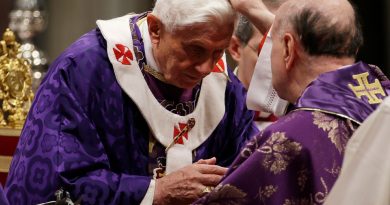Some final considerations on the Akathistos hymn to St Joseph the Bethroted
As we have been seeing the Akathistos hymn to St Joseph is certainly biblical. A persuasive example is the phrase which describes Joseph as righteous. This phrase is used some 26 times throughout the Akathistos hymn. Other details which give us the glimpse of the great internal struggle Joseph was going through in accepting Mary as his wife is to be found in the fourth ikos when it says: Having heard in the Scriptures of the Lord Who said: Behold, a Virgin shall conceive, and bear a Son, Emmanuel, you did believe what was told to you by the angel, O righteous Joseph; and like a sealed book, wherein the Word was inscribed by the finger of the Father, you took Mary into your own house, and like a servant you waited upon her with fear and zeal.
Another aspect which emerges with so much vigour in the Akathistos text is the twelve Alleluias we find at the end of each kontakion. The first kontakion serves to tell us who St Joseph, to whom we are praying, is and the reason why we are praying to him. O righteous Joseph! Chosen protector of the Most-Holy Virgin, Mary, and instructor and nurturer of the God-Man: glorifying your service to the ineffable mystery of the Incarnation of God the Word, we dedicate hymns of praise to you. Standing now before the throne of Christ our God, and having great boldness before Him, pray for us that cry out to you.
In the second Kontakion we sing the first explicit ALLELUIA because Joseph was the man worthy to be betrothed to the Virgin. The sign for Joseph’s election by God to wed Mary was the rod of [which] Joseph blossomed forth, committing the Virgin to him.
The second ALLELUIA that is found in the third kontakion tells us that Joseph, although he did not know of this wondrous mystery, namely that When the power of the Most High overshadowed her who knew not wedlock, so that she might conceive, the humble Joseph let himself be instructed by God Himself.
The third ALLELUIA, with which ends the fourth Kontakion, reveals Joseph’s tempest of thoughts of doubt to God. Joseph’s chastity is shown in accepting the angel’s message which disclosed to him the mystery of the birth of the Son of God, the Savior of the world, from the unwed Mary; for he said: And you shall call His name Jesus, for he shall save his people from their sins.
The fourth ALLELUIA is Joseph’s most holy cooperation with God’s grace that is rendered visible by his taking the divinely chosen maiden into [his] home. Instead of rebelling and pouring out his anger on Mary Joseph honored her as the most-holy Virgin and Mother of the Savior of the world, … ministered to her with fear and reverence, striving with all your soul to keep all that was written in the Law and the Prophets. And his most chaste and committed cooperation with God’s grace finds its zenith when he cried out to God … with Mary herself: ALLELUIA.
The fifth ALLELUIA, which is found at the end of the sixth kontakion, again shows Joseph’s complete obedience to what the angel told him to do. It says: Him Who was foretold by the Law and the Prophets you did circumcise on the eighth day, as a man; and you gave Him the name Jesus, which was preserved in the Counsel of the Trinity, like a precious pearl brought forth from the treasuries of Heaven for the revelation of all people. It interesting noting that Joseph’s obedience astonished the angels, made us glad, terrified the demons and rendered the whole world fragrant as with sweet-smelling myrrh.
The sixth ALLELUIA, which is placed at the conclusion of the seventh kontakion, keeps praising Joseph’s total obedience to God’s plan. It says: Desiring to save from the malice of Herod, Him that had come to save the world, O wondrous Joseph, you did not question the angel that commanded you to flee into Egypt, by saying: “Could He that saves others not save Himself”? But being a man of faith, like a new Abraham, ever ready for obedience, giving no thought to the rigors of the journey, nor considering the time of return, you did straightway take yourself to Egypt with Mary and the Babe. Joseph’s prompt obedience to God made him cry joyously not frustratingly to God!
The seventh ALLELUIA, unravels Joseph’s sense of fearsome wonder at the mirabilia Dei, which, in Pope Francis’ words, are “the concrete manifestations of the Word of revelation (Dt 26:5-10), as fully incarnated in the Logos of God, Jesus Christ, our Lord and Saviour (see John 1:14)”. The eight kontakion lists these mirabilia Dei one by one: that in Jesus, God was born in the flesh, as was foretold, and laid in a manger as a babe; the Virgin Mother; the angels giving glory and the circumcision; the coming of the Magi from the East to worship Him with gifts; the flight from Herod’s madness into Egypt; the salvation of all and the Light of the Gentiles; and the sword in the heart of her that gave Him birth, as Simeon said, — you knew Him to be true God and true Man.
The eight ALLELUIA, which concludes the ninth kontakion, extols Joseph’s authority over Jesus, whose every generation of Heaven, earth and the parts beneath the earth bow down at [his] name. This ALLELUIA powerfully portrays Lord’s great condescension toward Joseph. Thus, for us humans, it is really a great source of marveling.
The ninth ALLELUIA with which the tenth kontakion is finished, reminds us that have every reason to praise God for St Joseph due to the fact that since the Son of God made man was subject to [him] in all things on earth not listen to [Joseph] in all things as [he] now stand[s] before Him in Heaven. Hence, this is the reason that we have recourse to [the] intercession and aid [of] blessed Joseph. The presence of the angelic choirs at the very ending phrase of the kontakion highly asserts this fact.
The tenth ALLELUIA, that is inserted in the eleventh kontakion, praises the Lord for St Joseph because he, being divinely wise in keep[ing] the Lord Christ Himself from all harm and affliction, preserve[s] His Holy Church from every assault by enemies, visible and invisible; protect our native lands from all sedition, [and helps us] leading a peaceful and tranquil life. The introduction for this ALLELUIA is done in a spirit of compunctionate hymn do that we are to present to Joseph.
Regarding the eleventh ALLELUIA, which we find it closing the twelfth kontakion, Joseph is praised because he, seeing the Child Jesus increase in favor with God and man, and in stature of body and wisdom, … treasure entrusted to him, until the day when all believers began to cry to Him as God and Savior of the world: ALLELUIA! How blessed is Jesus who meditates on God’s wonderful deeds day and night (bible).
Finally, in the twelfth ALLELUIA, we are rejoicing of Joseph’s mighty mediation before Christ God. We perfectly know that by the grace of Christ God we can grow firm and steadfast in Faith, zealous and undaunted in the keeping of His commandments, and that He grant all that is profitable for our temporal and eternal life to us.
Hence, from these ALLELUIAS we can tangibly touch the holiness which God endowed St Joseph with. Furthermore, these ALLELUIAS help us to understand that the Akathist hymn to St Joseph is, in fact, a spiritual manual for us to follow Jesus Christ by St Joseph’s example. Above all, am I letting God instructing me in my life, as Joseph did, so that, like him, I can sing my own ALLELUIA in what and despite what, I go through in my life?
From my simple journey through the Akathist hymn to St Joseph the Betrothed I learned that the Josephology of the East, when it stands in a loving spiritual dialogue with that of the West, can enrich itself as well as enrich the other lung of Christianity. Moreover, it can evolve more like that of the West in that, while appreciating St Joseph as the betrothed of the Virgin Mary, the Mother of God and the human guardian of Christ child it can also explore St Joseph as the Worker too. St Joseph in the Christian East, like in the Christian West, is an excellent instructor of virtues. After Mary, and emulating her example, he was the perfect disciple of Christ.
For all these reasons the Akathist hymn to St Joseph the Betrothed, for sixteen times, entreats St Joseph with these powerful words: O righteous Joseph, ready helper and intercessor for our souls!
Fr Mario Attard OFM Cap





